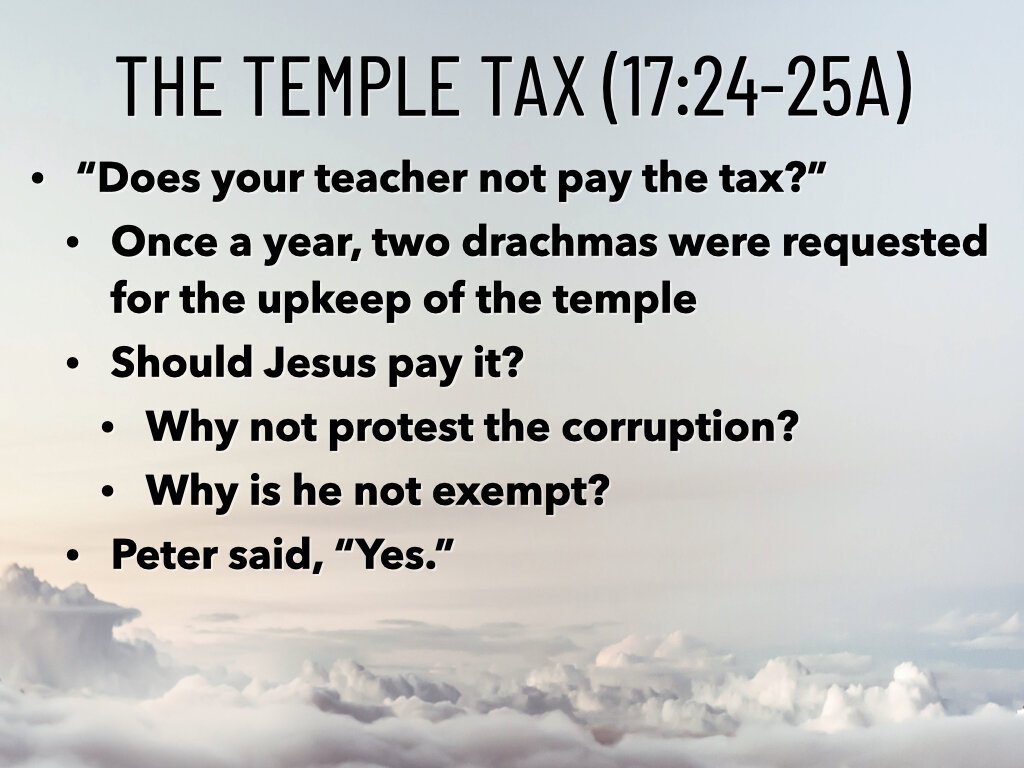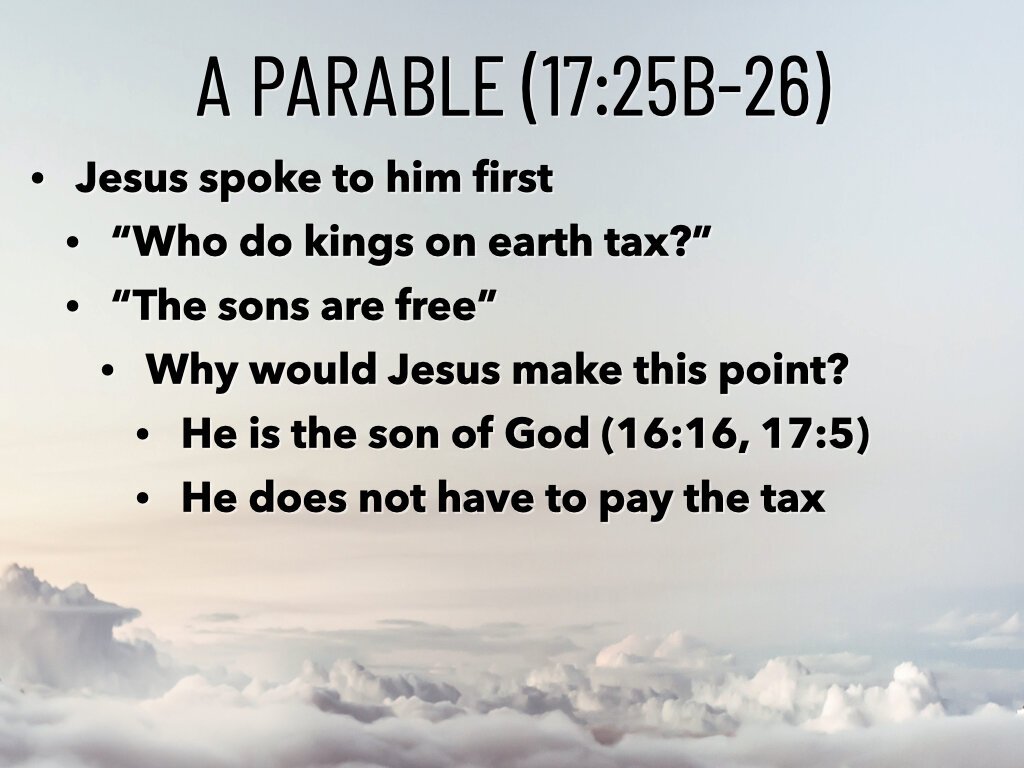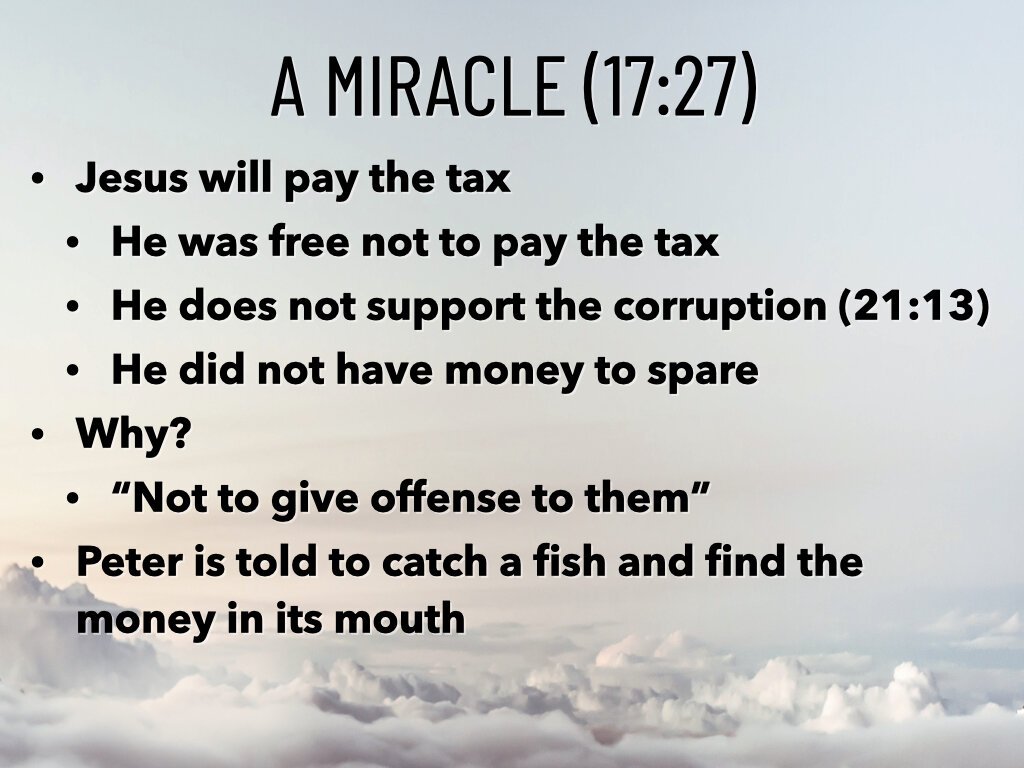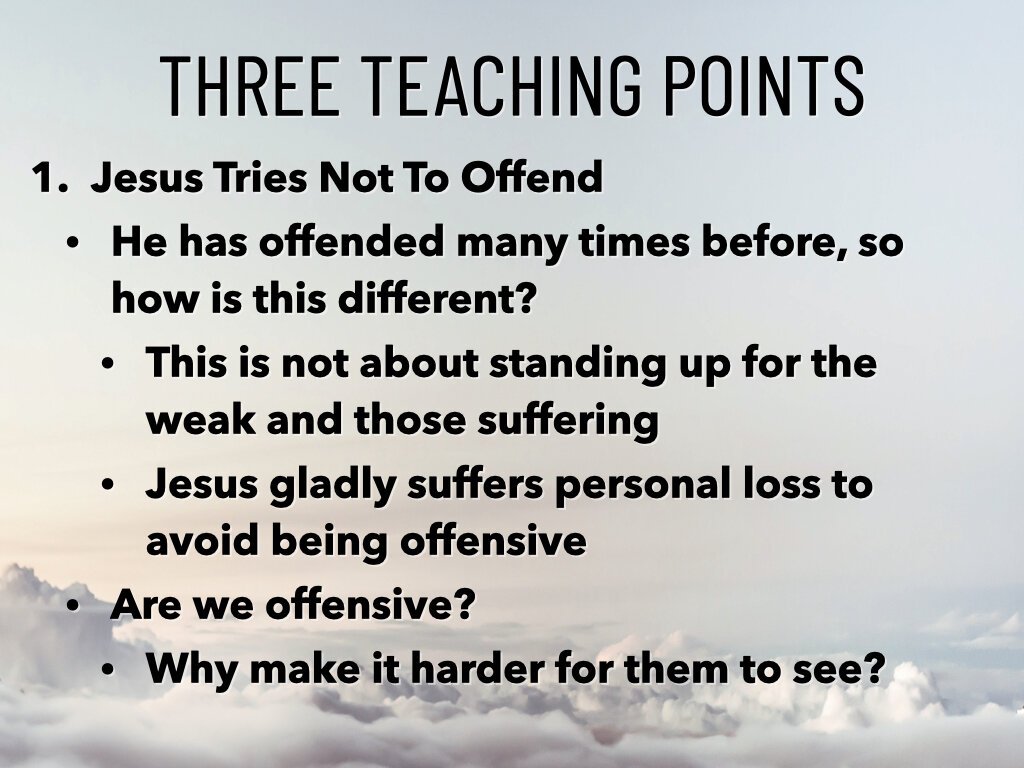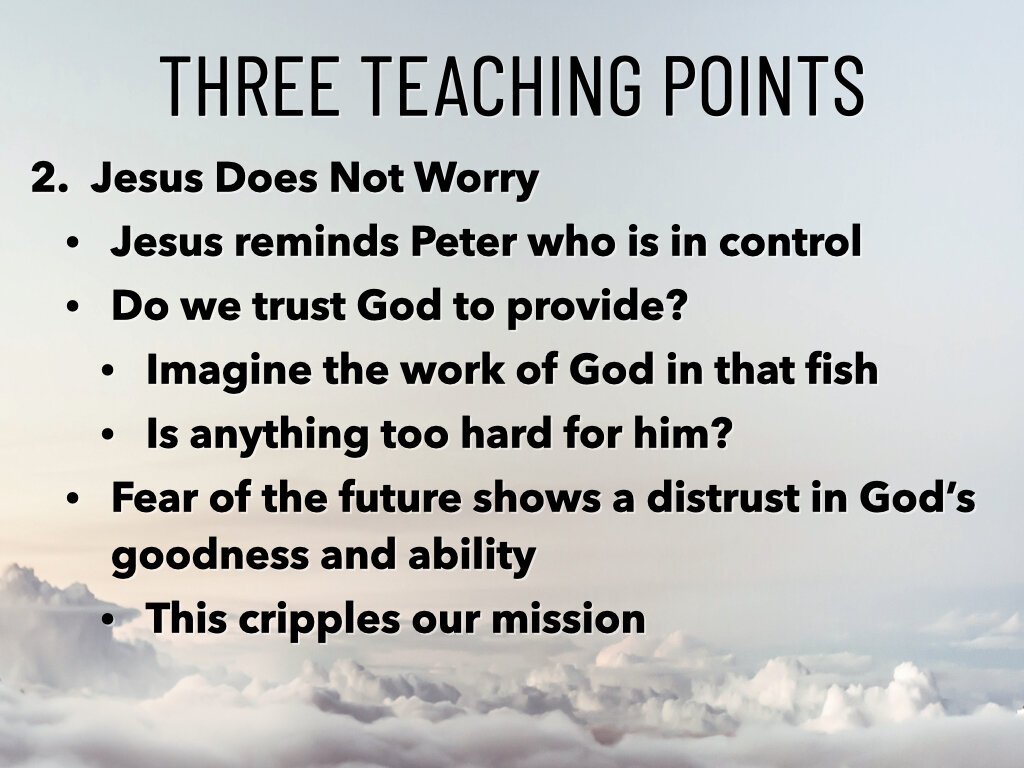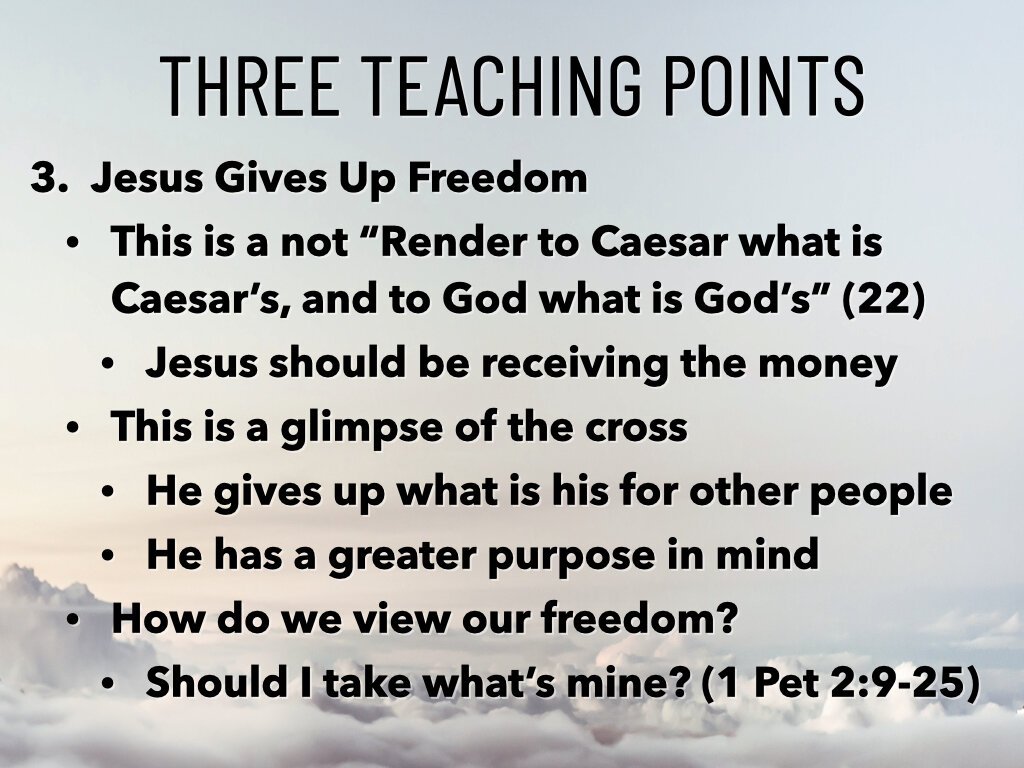Are You Free? (Matthew 17:24-27)
Freedom is a great word and a great idea. However, freedom is often misunderstood. What is freedom, and where does it come from? We know that there is a Constitution and a Bill of Rights that outline individual freedoms agreed to in our country. We are free to speak what we want, worship how we want, and own weapons. Is this the extent of freedom? In a broader sense, freedom is the ability to do whatever we want whenever we want without any consequences. The truth is that we are not entirely free. All of the freedoms described in our Constitution and Bill of Rights have limitations. We are limited by law. But aren't we grateful that our neighbor is not free to kill us or rob us? We don't want everyone to have complete freedom to do whatever they want. So the question is, how much freedom should be given.
Governments might debate this topic, but how much freedom do we really have? Freedom is not completely given to us by our government nor can it be taken away by a government. The freedom we have to act as we want, think as we want, and do what we want is all from God. He gives it and he can take it all away in an instant through death. He could even make us into robots who do whatever he tells us to do. But he doesn’t want to do that. He wants to make us freer, not less free. He created us as free moral agents. Freedom comes in many different forms, but it all comes from God. The freedoms of this country are from God. The government has been set up by God to provide or restrict freedom, according to God's will. How should we view freedom? Our text in Matthew will reveal something important about the freedom we have as God’s children.
Presuming
Matthew 17:24--25a (ESV) --- 24 When they came to Capernaum, the collectors of the two-drachma tax went up to Peter and said, “Does your teacher not pay the tax?” 25a He said, “Yes.”
First, notice that there is a tax collector in this story. Matthew is a tax collector, so he brings this instance up when no other gospel does. This tax collector is not frowned upon like Matthew. The ESV calls this the "two-drachma tax." What is that? Most other translations include the fact that it is the temple tax. Once a year, many Jews would give two drachmas to help support the upkeep of the Temple. This was started during Nehemiah's time, but there is little precedent for it to continue at this time. Jesus will later point out that the Temple is full of corruption and robbery.
Notice that their question is posed in a way that assumes Jesus would pay. So Peter responds in the affirmative on Jesus' behalf. He assumes that Jesus would want to pay this tax. But when we stop to think about this, does it make sense for Jesus to pay? Wouldn't this be another opportunity for Jesus to protest the corruption of the religious leaders? Not only that, but Jesus is a member of two groups who are exempt from paying this tax. He is poor, and he is a rabbi. The most notable reason Jesus did not need to pay this tax is one that Peter just witnessed. Jesus is the actual Temple of God. We can see that they both misunderstood who Jesus is.
A Parable
Matthew 17:25b--26 (ESV) --- 25b And when he came into the house, Jesus spoke to him first, saying, “What do you think, Simon? From whom do kings of the earth take toll or tax? From their sons or from others?” 26 And when he said, “From others,” Jesus said to him, “Then the sons are free.
Jesus answers Peter with a question before Peter even tells him what has happened. He says, "From whom do kings of earth take toll or tax? From their sons or from others?" When Peter acknowledges that everyone except the sons of the king pay taxes, Jesus makes the necessary conclusion, "The sons are free."
Why does Jesus want to make this point to Peter? Is he trying to explain why he won't pay the tax? Remember, at the beginning of this Chapter God called Jesus his son. As a son, Jesus is not subject to any taxation for the kingdom of God. Verse 27 tells us that he plans to pay the tax, so that can't be it. Jesus is reinforcing the significance of God's words for Peter.
An Answer
Matthew 17:27 (ESV) --- 27 However, not to give offense to them, go to the sea and cast a hook and take the first fish that comes up, and when you open its mouth you will find a shekel. Take that and give it to them for me and for yourself.”
The last verse in our section reveals that Jesus will pay the tax. He is not supportive of the corrupt temple workers, he does not have money to spare, and he is not subject to that taxation in any way. But he wants to keep from offending those who don't understand who he is. So he tells Peter to go down to the sea and throw a hook into the water. He will catch a fish with the money needed for both of them.
No information is given about what Peter did or what happened, but we can assume that everything went as Jesus said. Things always go as Jesus says.
What's The Point?
As we read this story, it might throw us off a little bit. Jesus agrees to pay a tax he doesn't owe, but he sends his disciple out to catch one fish that will pay for it. Isn't this odd? What can we learn from a text like this? There are three problems that Jesus addresses in this text.
1. Offending the Jews
2. Finding the money
3. Jesus didn't use his freedom for evil
1. Jesus Didn't Give Offense
This is a voluntary tax similar to a census that the Jews would collect. It was more like a tradition than a tax. Sadducees, rabbis, and various sects would avoid paying it after the first time.
Jesus has plenty of reasons not to pay the tax. He is not subject to the temple tax because he is the Temple of God. They should be giving him the money. But Jesus' reason for paying this tax is that he doesn't want to give them offense. This is an interesting idea when we consider everything we have seen thus far in Matthew. Jesus has not been concerned with what other people think of him. The Pharisees have been offended by his stance on handwashing, disciples not fasting, healing on the Sabbath, and gleaning on the Sabbath. They are offended by everything Jesus does, but here we see Jesus willing to bend on the temple tax. He has every reason to avoid paying this tax, but he pays it to avoid offending them.
Why is Jesus paying this tax after refusing to give in so many other times? Notice that every other instance, Jesus was considering the best interest of his disciples or of those he was healing. He was willing to offend when it comes to standing up for the truth about God or standing up for those who are harshly being judged. But he is unwilling to offend when it takes a toll on his money. Jesus would rather give up his money than be offensive.
Imagine being the president of the US and being asked to pay for the redesign of the Whitehouse. But you know that most of the money you give will line the pockets of your enemies. What would our president say about that? Would he be offensive? What would we say about that? If we had a king, the king does not pay for his house. His people cannot guilt him into paying for his own house. That does not happen. Do we see how different Jesus is?
Are We Offensive?
How would we respond when someone tries to take our money for something we disagree with? Many people refuse to pay taxes because they disagree with the government's use of those taxes. Notice that Jesus has no issue giving money to the corrupt Temple. Giving them money was not participating in their sin.
But how would we feel if we were in that situation?
When someone tries to take what's ours, our response is usually not good. We feel disrespected when people belittle us and don't know who we are. Our tendency in those cases is to lash out, or, at the very least, we would reject them and give them nothing. Jesus makes a way to give them what they are seeking to avoid offending them.
I'm sure most of us hate offending people. It's the last thing we would ever want to do. We will give people the shirt off of our back so that we won't offend people. We needed to see Jesus letting people be offended to stand up for what is true and help those oppressed.
But since the social media age has dawned, it is apparent that many of us don't mind offending people. Maybe we enjoy the confrontation because we are in the right and they are in the wrong. Maybe it feels like a victory to make them realize their error. Or maybe we get so frustrated with the way other people are that we are willing to offend. We think that we are helping them, and we are passionate about the truth.
Jesus knew that forcing the truth down the throat of others would do no good. He does not do that, and neither should we. His mission was to make the message more palatable, not less. That doesn't mean he will conform and say whatever they want him to say. People will still be offended by his message, but their offense will not come from him shoving the truth down their throats every chance he gets. That's why the leaders had such a hard time condemning him. The people appreciated his approach to teaching. His message offends, but he is not offensive. We need to learn that.
2. God Provides
Another problem that Peter and Jesus face in this text is that they don't have money. Remember, Peter has given up his fishing to follow Jesus and Jesus only has money through charity given to him. But in this miracle, Jesus finds all the money that he needs.
Picture Peter throwing his hook in the water. A fish, under the command of God, picks up a shekel that someone has dropped into the sea, holds it in his mouth without swallowing, and bites on the hook. Then, Peter takes that to pay the tax. Isn't God amazing? Peter wouldn't have thrown a hook out. Peter would have gone back to work catching nets full of fish to pay the tax.
Jesus teaches Peter to rely on God. God can provide in the most unlikely circumstances. If a fish can bring money, what is there to worry about? Jesus lets Peter do something that would remind him of where he came from and where he is now. He was a fisherman, but now he has God.
Also, notice that Jesus doesn't abuse this power. This gives us a glimpse into a startling reality. He could have all the money he could ever desire.
Do We Trust God?
How difficult is it for us to let go of our money? What if we need that money for later? We don't want to give other people money because we worry about what will happen to us in our future. But worrying about the future is blind to God's care for us. It is complete distrust of God.
Look at how God provided the money for this tax. He provided it by giving them the exact amount they needed in the mouth of a fish. God gives him one fish with everything they need. Can God give us what we need? How hard is it for him to do that? We must learn to let go of fear and have faith in God.
Consider the fact that everything we have comes from God. The life we live, the air we breathe, the gifts and abilities we use to make money are all from God. It is so easy to keep God's gifts for ourselves. It's so easy to tell people, "I can't help you," and keep our money.
Do we see how disabling worry is? It cripples our faith and our work for God. It also causes us to get angry at others. If Jesus were worried about money, he would have lashed out at Peter for making that commitment. He would have offended the Jews over something less important than his primary mission. We might shrug that off and say, "No big deal!" But Jesus didn't want to be offensive to anyone.
3. Unused Freedom
What is this story about? Is it about taxation? Maybe some of us would think about what Jesus says in Matthew 22, "Render to Caesar what is Caesar's and to God what is God's." But notice how that text has a slightly different context than this one. Jesus is not making a point that we should submit to the governing authorities by paying their taxes. The key phrase in this story is, "Then the sons are free." That means the key idea is that Jesus doesn't owe anything. He has the freedom to avoid paying. But Jesus doesn't use his freedom. This is the third and most important principle. Here Jesus gives Peter a glimpse into the purpose of the cross.
Jesus never gets what he deserves while living on earth! He is the Son of God. He deserves all of mankind to lift him on the throne and bow in worship. They ought to kiss the son, lest he be angry! (Psalm 2) Jesus doesn't take what he can get. He doesn't use and abuse his rights to see how far he can go in life. Why not? Because he has a greater purpose in mind. This is the main point of the text.
How Do We View Our Freedom?
In Christ, we have been set free from sin and death (John 8:31-36, Romans 8:1-2). We are sons and daughters of God so we are completely free from the consequences of our past mistakes. His mercies are new every morning. Peter understood that better than anyone, but what about the freedoms on earth? When we read 1 Peter 2-3, we see that we can lay our freedoms down like Jesus.
1 Peter 2:9--25 (ESV) --- 9 But you are a chosen race, a royal priesthood, a holy nation, a people for his own possession, that you may proclaim the excellencies of him who called you out of darkness into his marvelous light. 10 Once you were not a people, but now you are God’s people; once you had not received mercy, but now you have received mercy. 11 Beloved, I urge you as sojourners and exiles to abstain from the passions of the flesh, which wage war against your soul. 12 Keep your conduct among the Gentiles honorable, so that when they speak against you as evildoers, they may see your good deeds and glorify God on the day of visitation. 13 Be subject for the Lord’s sake to every human institution, whether it be to the emperor as supreme, 14 or to governors as sent by him to punish those who do evil and to praise those who do good. 15 For this is the will of God, that by doing good you should put to silence the ignorance of foolish people. 16 Live as people who are free, not using your freedom as a cover-up for evil, but living as servants of God. 17 Honor everyone. Love the brotherhood. Fear God. Honor the emperor. 18 Servants, be subject to your masters with all respect, not only to the good and gentle but also to the unjust. 19 For this is a gracious thing, when, mindful of God, one endures sorrows while suffering unjustly. 20 For what credit is it if, when you sin and are beaten for it, you endure? But if when you do good and suffer for it you endure, this is a gracious thing in the sight of God. 21 For to this you have been called, because Christ also suffered for you, leaving you an example, so that you might follow in his steps. 22 He committed no sin, neither was deceit found in his mouth. 23 When he was reviled, he did not revile in return; when he suffered, he did not threaten, but continued entrusting himself to him who judges justly. 24 He himself bore our sins in his body on the tree, that we might die to sin and live to righteousness. By his wounds you have been healed. 25 For you were straying like sheep, but have now returned to the Shepherd and Overseer of your souls.
How rampant is our culture with the idea that we should take all that we can get and never let anyone disrespect us? These ideas have created toxicity that makes life unbearable at times. On the one hand, we have people yelling about their right to carry a weapon. On the other side, we have people yelling about their right to be treated equally. People argue and fight about all kinds of rights they think they deserve to have. But Jesus has every right as the king of the universe, and he doesn't fight with anyone.
Isn't it sad that we care more about our freedoms than the souls of those around us? There is nothing wrong with enjoying our freedoms or sharing our opinions in a thoughtful and considerate way, but why do we feel the need to be offensive? Why are we worried about losing freedoms when the one who gives us all freedoms is still in control?
Conclusion
We aren't here to enjoy a life of endless freedoms and liberty. We are here to glorify God and bring lost souls to Christ. If any freedom of mine gets in the way of that, I need to lay it down to silence foolish people's ignorance and bring souls to Christ. We don't deserve freedom. We deserve death as punishment for our sins. But God offers the ultimate freedom of being his child. Will we humbly submit to his will and stop using our freedoms for evil?


